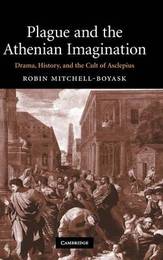
|
Plague and the Athenian Imagination: Drama, History, and the Cult of Asclepius
Hardback
Main Details
| Title |
Plague and the Athenian Imagination: Drama, History, and the Cult of Asclepius
|
| Authors and Contributors |
By (author) Robin Mitchell-Boyask
|
| Physical Properties |
| Format:Hardback | | Pages:224 | | Dimensions(mm): Height 229,Width 152 |
|
| Category/Genre | Literary studies - classical, early and medieval |
|---|
| ISBN/Barcode |
9780521873451
|
| Classifications | Dewey:882.0109162 |
|---|
| Audience | | Professional & Vocational | |
|---|
|
Publishing Details |
| Publisher |
Cambridge University Press
|
| Imprint |
Cambridge University Press
|
| Publication Date |
13 December 2007 |
| Publication Country |
United Kingdom
|
Description
The great plague of Athens that began in 430 BCE had an enormous effect on the imagination of its literary artists and on the social imagination of the city as a whole. In this book, Professor Mitchell-Boyask studies the impact of the plague on Athenian tragedy early in the 420s and argues for a significant relationship between drama and the development of the cult of the healing god Asclepius in the next decade, during a period of war and increasing civic strife. The Athenian decision to locate their temple for Asclepius adjacent to the Theater of Dionysus arose from deeper associations between drama, healing and the polis that were engaged actively by the crisis of the plague. The book also considers the representation of the plague in Thucydides' History as well as the metaphors generated by that representation which recur later in the same work.
Author Biography
Robin Mitchell-Boyask is Associate Professor of Classics at Temple University. His publications include numerous articles on Greek and Latin literature and an edition of Euripides' Hecuba (2005).
ReviewsThis is clearly a book that could only be written by a seasoned scholar who has spent a great deal of time with Greek tragedy. Its observations are so wide-ranging and comprehensive, the connections it draws so ingenious and unexpected, that they could only be the product of long engagement with these texts. Even if they ultimately decide not to side with M-B on many of his particular readings, students of tragedy, ancient medicine, and Athenian social and religious history will undoubtedly benefit from this creative and original book. --BCMR
|